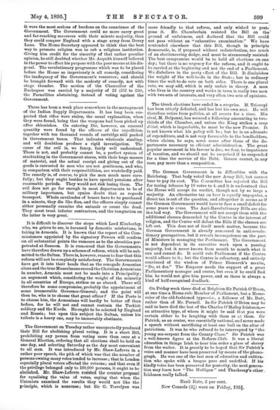The Government on Tuesday rather unexpectedly produced their Bill for
abolishing plural voting. It is a short Bill, prohibiting any person from voting more than once at a General Election, ordering that all elections shall be held on one day, and selecting Saturday as the day most convenient to all men. It was introduced by Mr. Shaw-Lefevre in a rather poor speech, the pith of which was that the number of persons owning many votes tended to increase; that in London especially plural voters affected the returns; and that even if the privilege belonged only to 160,000 persons, it ought to be abolished. Mr. Shaw•Lefeyre resisted the counter proposal for equalising the value of votes, saying that when the Unionists examined the results they would not like the principle, which is nonsense; but Sir G. Trevelyan was more friendly to that reform, and only wished to post.. pone it. Mr. Chamberlain resisted the Bill on the ground of unfairness, and declared that the Bill could not pass without an "exhaustive examination." We have contended elsewhere that this Bill, though in principle democratic, is, if proposed without redistribution, too much of an electioneering dodge, and must be strenuously resisted. The best compromise would be to hold all elections on one day; but there is no urgency for the reform, and it ought to be carried at the beginning and not the end of a Parliament. We disbelieve in the party effect of the Bill. It diminishes the weight of the well-to-do in the State ; but in ordinary times the well-to-do vote on both sides. There is one plural vote, we may add, which is only unfair in theory. A man who lives in the country and works in town is really two men with two sets of interests, and very often two sets of opinions.






































 Previous page
Previous page